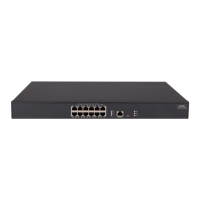16
When you use the mad arp enable command, the system prompts you to enter a MAD domain ID. If
you do not want to change the current MAD domain ID, press enter at the prompt.
An IRF fabric has only one IRF MAD domain ID. You can change the IRF MAD domain ID by using
the following commands: irf domain, mad enable, mad arp enable, or mad nd enable. The IRF
MAD domain IDs configured by using these commands overwrite each other.
Examples
# Enable ARP MAD on VLAN-interface 3.
<Sysname> system-view
[Sysname] interface vlan-interface 3
[Sysname-Vlan-interface3] mad arp enable
You need to assign a domain ID (range: 0-4294967295)
[Current domain is: 0]: 1
The assigned domain ID is: 1
Related commands
irf domain
mad enable
Use mad enable to enable LACP MAD.
Use undo mad enable to disable LACP MAD.
Syntax
mad enable
undo mad enable
Default
LACP MAD is disabled.
Views
Aggregate interface view
Predefined user roles
network-admin
Usage guidelines
LACP MAD requires an H3C device that supports extended LACPDUs to act as the intermediate
device. You must set up a dynamic link aggregation group that spans all IRF member devices
between the IRF fabric and the intermediate device. To enable dynamic link aggregation, configure
the link-aggregation mode dynamic command on the aggregate interface.
If one IRF fabric uses another IRF fabric as the intermediate device for LACP MAD, you must assign
the two IRF fabrics different MAD domain IDs for correct split detection. False detection causes IRF
split.
When you use the mad enable command, the system prompts you to enter a MAD domain ID. If you
do not want to change the current MAD domain ID, press enter at the prompt.
An IRF fabric has only one IRF MAD domain ID. You can change the IRF MAD domain ID by using
the irf domain, mad enable, mad arp enable, or mad nd enable command. The IRF MAD domain
IDs configured by using the commands overwrite each other.
Examples
# Enable LACP MAD on Bridge-Aggregation 1, a Layer 2 dynamic aggregate interface.
<Sysname> system-view

